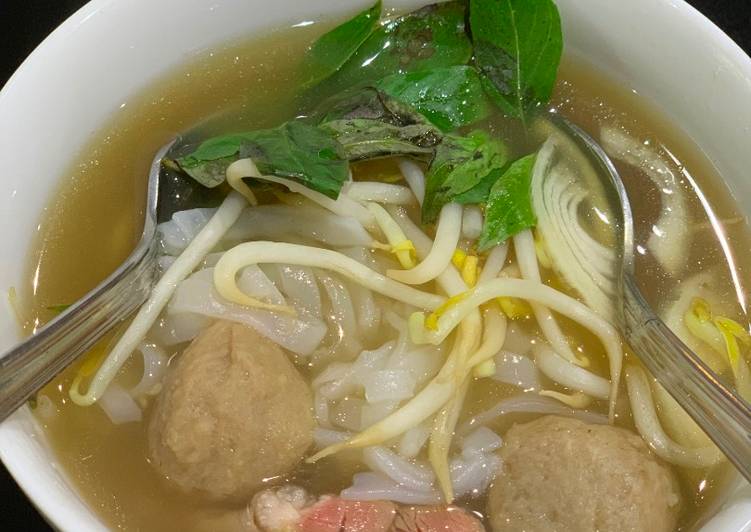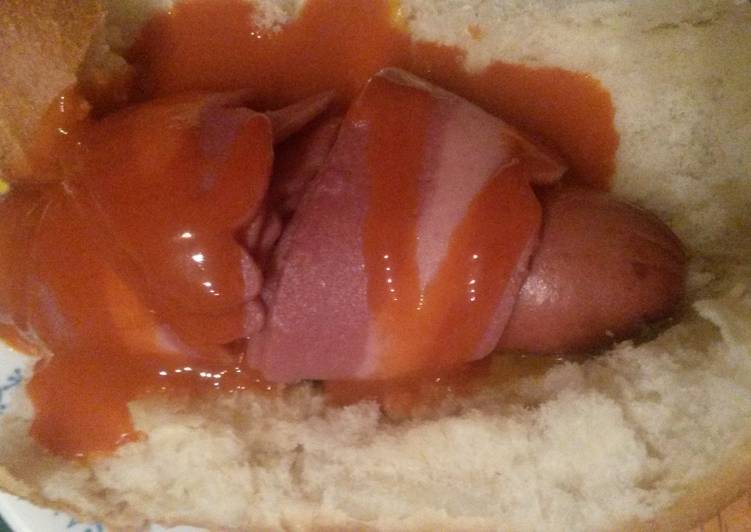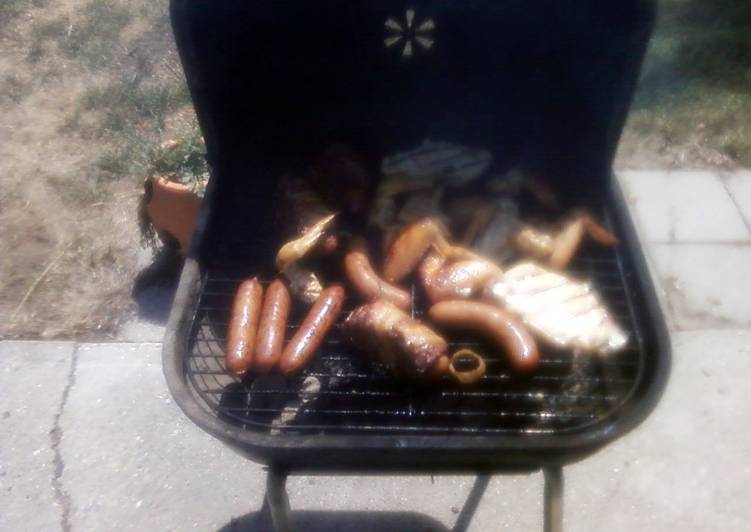
Hello everybody, I hope you’re having an incredible day today. Today, we’re going to prepare a special dish, pho (vietnamese beef soup). One of my favorites food recipes. For mine, I will make it a bit unique. This will be really delicious.
Pho (Vietnamese Beef Soup) is one of the most well liked of current trending meals in the world. It is simple, it’s quick, it tastes yummy. It’s appreciated by millions every day. They’re fine and they look fantastic. Pho (Vietnamese Beef Soup) is something that I have loved my whole life.
Read Customer Reviews & Find Best Sellers. They sometimes form the bulk of salads and soups and are often used as wrappers, seasonings and condiments. Here, a pile of fresh herbs are served alongside this classic Vietnamese beef soup, so. Pour hot broth over the top.
To begin with this particular recipe, we must first prepare a few components. You can cook pho (vietnamese beef soup) using 26 ingredients and 8 steps. Here is how you cook it.
The ingredients needed to make Pho (Vietnamese Beef Soup):
- Take broth
- Take 5-6 pounds beef knuckles or leg bones
- Make ready 6 quarts cold water
- Make ready 2 medium onions, quartered
- Prepare 4 -inch piece of fresh ginger, halved lengthwise
- Take 2 cinnamon sticks
- Take 1 tablespoon coriander seeds
- Make ready 1 tablespoon fennel seeds
- Prepare 6 star anise
- Take 6 whole cloves
- Prepare 1 black cardamom pod (see note below)
- Get 1 1/2 tablespoons salt
- Get 1/4 cup fish sauce
- Get 1 -inch piece yellow rock sugar (see note below)
- Prepare assembly
- Get 1 pound small (1/8-inch wide) dried or fresh “banh pho” noodles (see note)
- Make ready 1/2 pound raw eye of round, sirloin or tri-tip steak, thinly sliced across the grain (see note)
- Make ready 1/4 cup thinly sliced onions (see note)
- Make ready 1/4 cup chopped cilantro leaves
- Take for the table
- Take Sprigs fresh mint and/or Asian/Thai basil
- Make ready Bean sprouts
- Make ready Thinly sliced red chilies (such as Thai bird)
- Take Lime wedges
- Take Fish sauce
- Take Hoisin sauce
Phở Bò (Vietnamese Beef Pho Noodle Soup) is the national dish of Vietnam, a dish that many Vietnamese hold dear to their heart. Learn the authentic way to make beef pho and serve it like a true Vietnamese, as well as cooking tips you may not find elsewhere. Set a rack in the upper third of the oven and preheat the broiler. Drain the bones in a colander and rinse under cold running water.
Instructions to make Pho (Vietnamese Beef Soup):
- Add beef bones to a large pot that will hold at least 10 quarts. Then, cover bones with cold water. Place pot onto high heat and bring to a boil. Boil for 3 to 5 minutes. During this time, impurities and foam (or scum) will be released and rise to the top. Drain bones, discarding the water. Then, rinse bones with warm water and scrub stockpot to remove any residue that has stuck to the sides. Add the bones back to the stockpot and cover with 6 quarts of cold water.
- Meanwhile, move an oven rack to a high position then turn broiler to high. Line a baking sheet with aluminum foil. Place quartered onions and halved ginger onto baking sheet then broil for 10 to 15 minutes, turning onions and ginger occasionally so that they become charred or browned on all sides.
- Add cinnamon sticks, coriander seeds, fennel seeds, star anise, cloves and the black cardamom pod to a dry frying pan. Place onto low heat and cook, stirring occasionally until fragrant. About 5 minutes. Place toasted spices into a cotton muslin bag/herb sachet or cheesecloth then tie with butchers twine to seal.
- Bring stockpot with parboiled bones and water to a boil then lower to a gentle simmer. Add charred onion and ginger as well as the bag or sachet of toasted spices. Add 1 1/2 tablespoons of salt, a 1/4 cup of fish sauce and the rock sugar. Continue to simmer broth, uncovered, for 3 hours. If at any time foam or scum rises to the surface, use a spoon to remove it.
- Use tongs or a wide mesh spoon to remove bones, onion and ginger from broth then strain broth through a fine mesh strainer. The broth will have a layer of fat at the the top. There are two ways to remove this. First, if you plan to enjoy the broth now, skim the fat from the top of the broth using a spoon. If you do not mind waiting, you can also pour broth into containers then refrigerate overnight. As the broth cools, the fat will solidify, making it very easy to remove.
- ASSEMBLY - Bring the broth to a gentle simmer over medium heat. - - If you are using dried noodles, add noodles to a bowl then cover with hot water and soak for 15 to 20 minutes until soft and opaque. If you are using fresh, add to a colander then rinse with cold water.
- To cook the noodles, bring a medium saucepan filled with water to a boil. Place noodles into boiling water and cook for about 10 seconds or until they collapse. Drain noodles then divide between bowls. (We like to fill each bowl by 1/3 with noodles).
- Arrange slices of raw meat into bowls, and then top with the hot broth. Finish broth with onion slices and cilantro. Serve bowls with a plate of optional garnishes listed above.
Set a rack in the upper third of the oven and preheat the broiler. Drain the bones in a colander and rinse under cold running water. Other slow cooking cuts like chuck and gravy beef are also less "beefy". Pho (I found out in college that it's actually pronounced "fuh." For someone who'd been shamelessly calling it "foe" for eighteen years, this was an embarrassing revelation) is a Vietnamese noodle soup that's often made with beef and topped with awesome things like fresh bean sprouts, basil, and chilies. Vietnamese Beef Noodle Soup (Pho Bo) Beef Noodle Soup (Pho Bo) is a quintessential Vietnamese dish and this step-by-step recipe shows you how to make this amazing, hearty soup from scratch.
So that is going to wrap it up for this special food pho (vietnamese beef soup) recipe. Thanks so much for reading. I am confident that you can make this at home. There’s gonna be interesting food at home recipes coming up. Remember to save this page on your browser, and share it to your loved ones, friends and colleague. Thanks again for reading. Go on get cooking!



